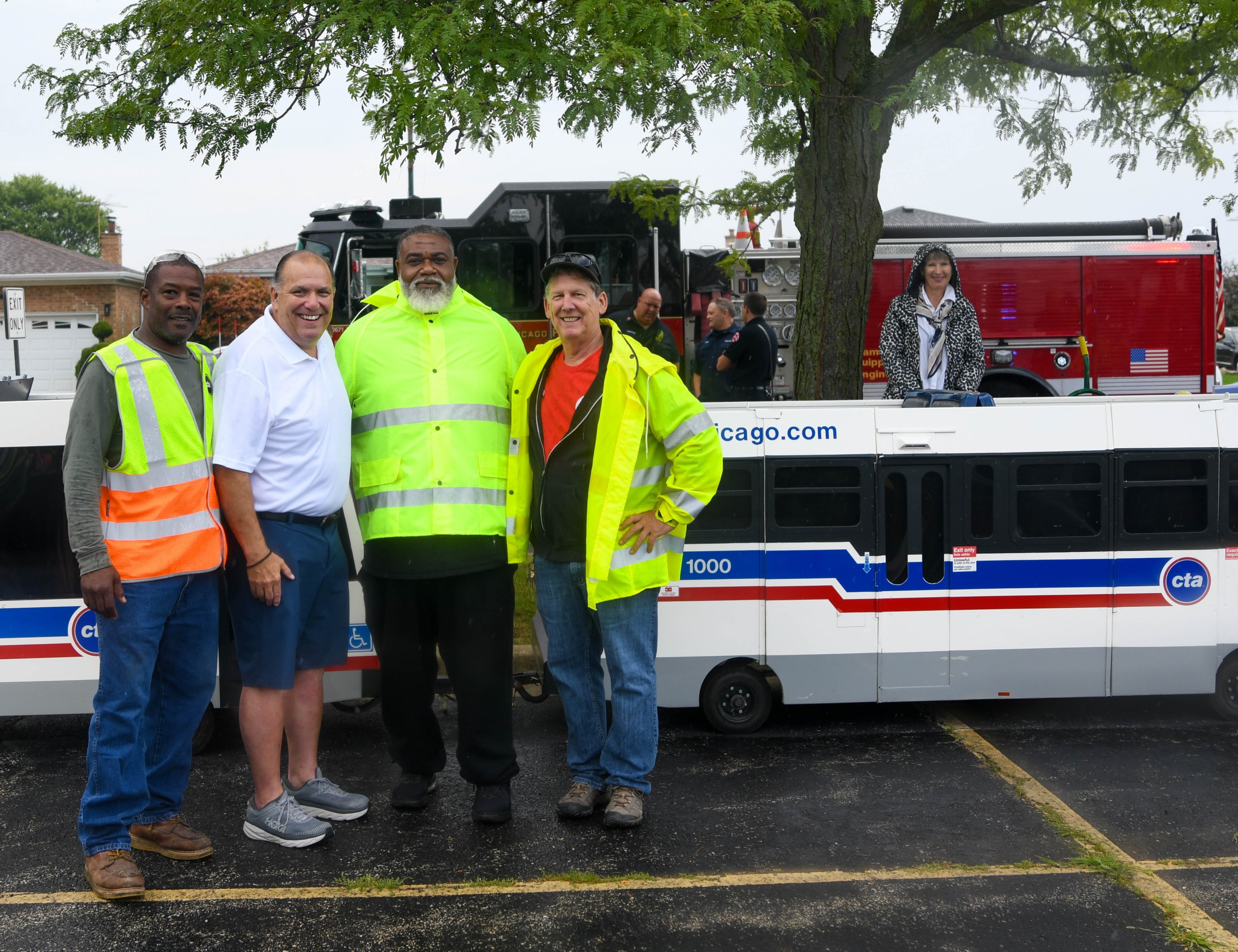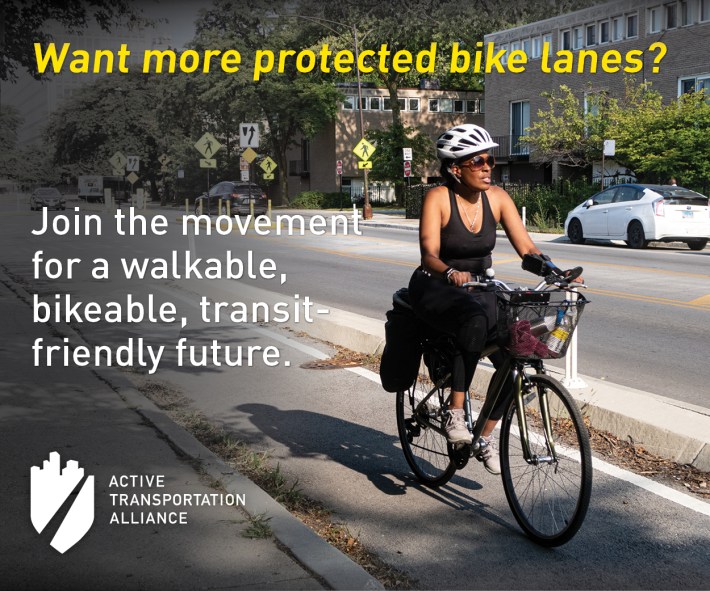
"Slow motion riders fly the colors of the day...
Listen now children, all is not lost.
- "Saturday in the Park", 1972, by the band Chicago, previously called the Chicago Transit Authority. The group's late guitar player Terry Kath, whom Jimi Hendrix called "the best guitarist in the universe," grew up in Chicago's Norwood Park neighborhood, which is in the Illinois House's 20th district.
With Streetsblog's interviews with Illinois lawmakers about efforts to avert the impending $771 million Chicagoland transit fiscal cliff, I've tried to make the series both bipartisan and bicameral. I've talked to two pro-public transportation Republican State Senators so far, Sen. Don DeWitte, Minority Spokesperson on the Senate Transportation Committee, and Sen. Seth Lewis, also on that committee. While many SBC readers may disagree with some of their positions, these were cordial, informative discussions.
A spokesperson for Illinois Senate Republican Caucus checked in with their counterpart in the House, and that person hadn't heard about GOP representatives working on transit matters. However, Rep. Kam Buckner, a Democrat and co-leader of the House's Public Transit Working Group, suggested I talk to Rep. Brad Stephens of the 20th District.
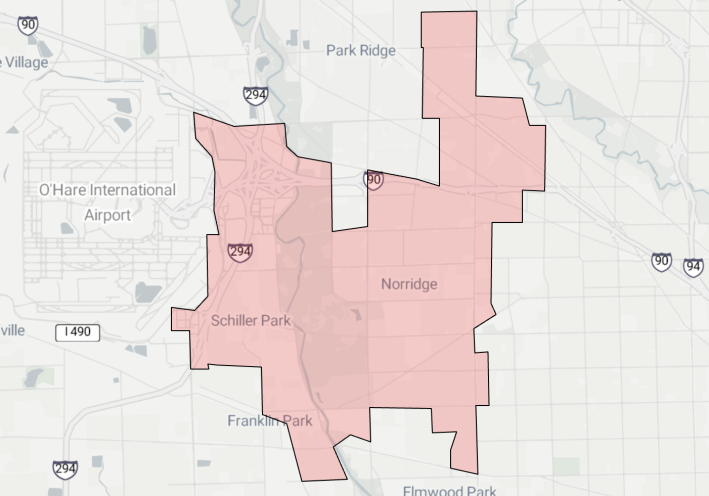
Stephen's House territory includes some or all of Chicago's Edison Park and Jefferson Park; and suburban Rosemont, Norridge, Schiller Park, and Franklin Park, and he also doubles as Village President of Rosemont. (More on that in a bit.) This mix of city communities and 'burbs includes plenty of CTA, Pace, and Metra reliant constituents, and Stephens is the only Republican in the relevant working group. "The Democrats put me on the working group, and I said, “What, do you guys need a Republican to blame now?" he joked in our interview.

If Brad Stephens' last name sounds familiar, it's because his late father Donald E. Stephens proceeded him in the mayoral position, and is the namesake of the local convention center. Fun fact: An enthusiastic collector of Hummel figurines, he founded The Donald E. Stephens Museum of Hummels, 9513 W. Higgins Rd. in Rosemont, boasting the largest public display of these porcelain figurines on the planet.
Despite Brad Stephens' joke, he's well-qualified to be in the working group because he previously served on the Pace board, as well as the Illinois State Toll Highway Authority. Learn more about his accomplishments, such as overseeing the recent development of Impact Field, home of the Chicago Dogs, a minor league baseball team with a fun frankfurter logo.

As with DeWitte and Lewis, this interesting interview was proof that, even in this wild political era, you should never assume someone's not worth talking to just because they're on the other side of the legislative fence. That's not to mention that GOP votes would be very helpful for passing a transit reform/funding bill with the required 60 percent supermajority during next month's veto session.
This is a long article, so I'd suggest relaxing with your favorite beverage to read it, ideally somewhere you can enjoy the nice early-autumn Chicagoland weather.
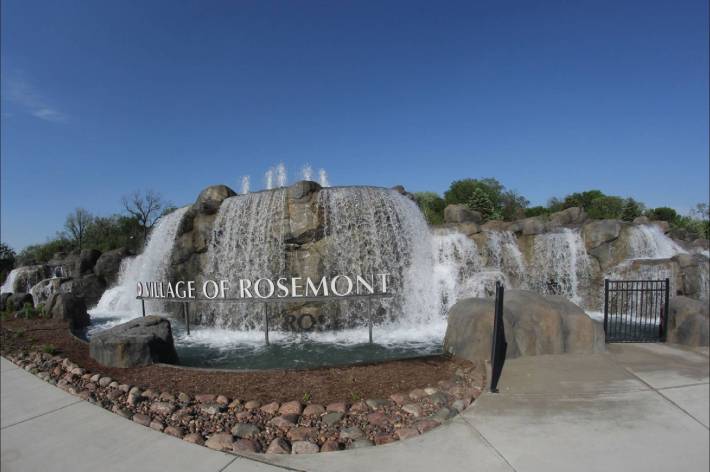
John Greenfield: Like I said, Rep. Buckner your recommended you. So I assume things are pretty civil between you guys.
RBS: We’re all friends. I mean, it's been a really, really solid conversation, and throwing great ideas after great ideas, and some that are not so, but we all have very open dialogue and it's been very, very fluid. So hopefully we can get something done, and what that is yet to be seen. But I think that we're all working, and we all understand the value and the need to do something for transit.
JG: And transit is probably as important to your constituents and people who visit your district as any of the suburban Republicans, isn't it? Do you have the Allstate Arena in your district?
RBS: Actually, it's just outside of the district. But with my other hat as Mayor of Rosemont, transit is very critical for that and for getting people to and from work in Rosemont. Here we've got the CTA Blue Line station on River Road. It's a central hub where Pace comes into it and takes people out to shop and work, as far out as Batavia.

And then on the city side of my district, because it's 50/50 suburbs and city, I've got Edison Park, Jefferson Park, and then at the southern end, I've got Schiller Park. It's got a Metra station... And the Blue Line station is the last stop before you go into O’Hare. So those are all this is very, very important to me.
This can't be a city-versus-suburbs thing. This isn't about, "That wasn't fiscally conservative enough," or "That one they gave great contracts to this union." That's not what this is about. We're where we're at, at a place in time. We need to address it and figure out how we're going to keep transit safe, clean, and at a level that it gets people to and from their jobs, to and from their leisure activities, still affordable, in a civil manner.
I don't know if you've seen any of my political career in Springfield, it's only been six years, but I'm not one that's going to stand up and grandstand and throw rhetoric and hate and all that around. I'm one that's there to get things done, not to cause issues with other people. We're all there. We all represent 108,000 people. We need to work together on things, and not so much working against one another.
JG: You did not do the transit fact-finding trip to Germany that Sen. DeWitte and Sen. Lewis did last December, did you?
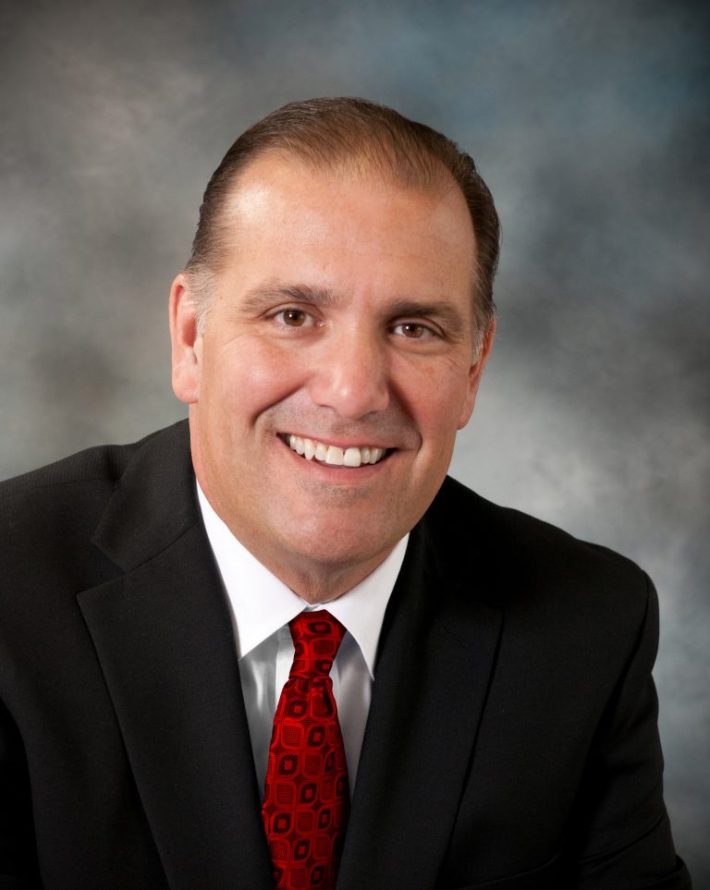
RBS: No, it was sort of a late invite, and I just couldn't pull it together.
So let be clear, I call both Kam and [Illinois House Majority Leader Eva-Dina Delgado] dear friends as well as trusted colleagues, and we talk frequently, maybe not as much as we should, about where we're going here, but they're great friends as well, so I don't dislike anybody.
JG: Yeah, the vibe I get from all three you folks is pretty positive. That's a good way to be as a politician. So it seems like the major differences I've heard between transit-reliant Republicans and Democrats – and all the Republicans I've spoke to so far are pretty much suburbanites – basically boils down to two philosophies.
The Democrats say they don't want to kick the can down the road. They don't want to just preserve the dysfunctional status quo of our transit system, but improve it. And that would require giving the system enough funding [they're calling for $1.5 billion in new annual state funding.] They also want to give the umbrella organization [currently the relatively toothless Regional Transportation Authority], which would become the Northern Illinois Transit Association, sufficient clout to get things done.
In contrast, the transit-friendly Republicans that I've spoken to are in favor of not raising fares and surcharges. Sen. Lewis, said he wanted to wait until the NITA board is fully established, fund it for three years, and then let the funding sunset before increasing transit funding.
And some Republicans don't want to see the 15 City of Chicago, Cook County, and State of Illinois representatives on the NITA vote together and be allowed to override opposition from the five collar county reps. Your district isn't in a collar county.
RBS: The 20th District is in Cook, and I'm the one Illinois House Republican that represents any part of Chicago.
JG: What this seems to be about is finding some common ground between the Republicans and the Democrats. I mean, what I often say in these interviews is that I think the situation with transit in Chicagoland and Illinois is actually kind of heartwarming. There's so much craziness going on right now with political discord, so it's nice that there's still an issue where people can have differences of opinion, but still be willing bargain and negotiate and try to come up with solution that everybody can live with. So it's, it's nice to know that civil politics do still exist between different parties. You know, reading the national news, you would just think that wasn't a thing anymore.
RBS: Gosh! [Laughs.]
JG: But that’s a whole other can of worms.
RBS: Anyway, to the point you were making, being a little bit more on the moderate-conservative side, obviously I have some concern with just throwing the billion and a half without having the board in place and having them involved with making the decisions. [These include] where are these efficiencies, and how are we going to get there, and making sure that that all of the money that's sent to the agencies is spent well. I'd like to see – and voiced this to Leader Delgado – that the five governor appointments be one for the governor and one for each of the legislative leaders. That's because we are being asked, and rightfully so, to find some solution and how the revenue gets generated for this, that our leadership has a say-so in who those people are that are making those decisions from those five appointments.
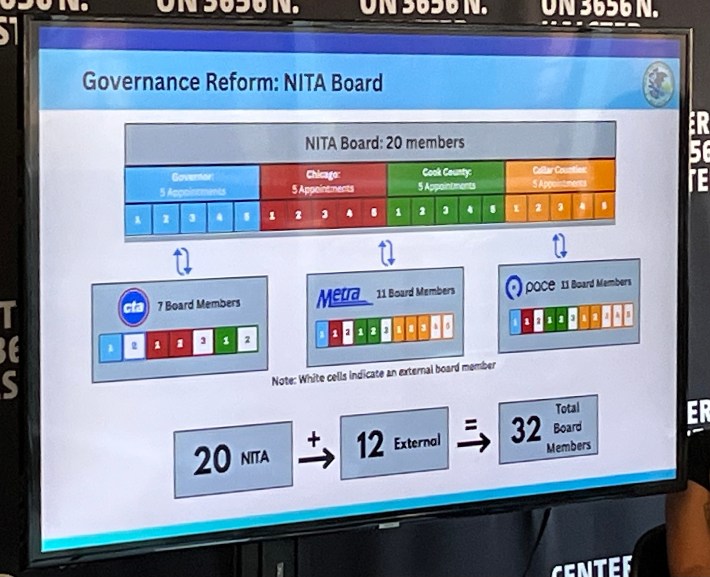
The proposed transit governance restructuring for NITA, which would replace the RTA.
Delgado talked about needing two votes from each of the sub-boards if you want to call them that, or to be able to make a decision... I think that's somewhat of an olive branch to the concerns of the suburban districts.
JG: You don't particularly have a dog in that race. You're a Republican, but you're not a collar county Republican, although I assume you would generally side with your team about this issue.
The Republicans I've talked to said that they're worried that the new governance structure would allow a majority to steamroll over a minority of five. I discussed that concern with a guy named Richard Day who has freelanced for us, who knows the NITA proposal very well. He said if a large majority directors didn't have that ability to override a small minority, there would be major disadvantages for both the collar counties and the city.
And the example Richard gave is, let's say it would be a good thing for the entire if the Metra Electric line to became rapid transit, and had more frequent service. But that might be something that suburbanites would be opposed to, because it would probably make the trips a little longer, since there'd be more stops, things like that. So having that 15 vote override would allow that good thing to happen, that everything but the collar county people want to happen.
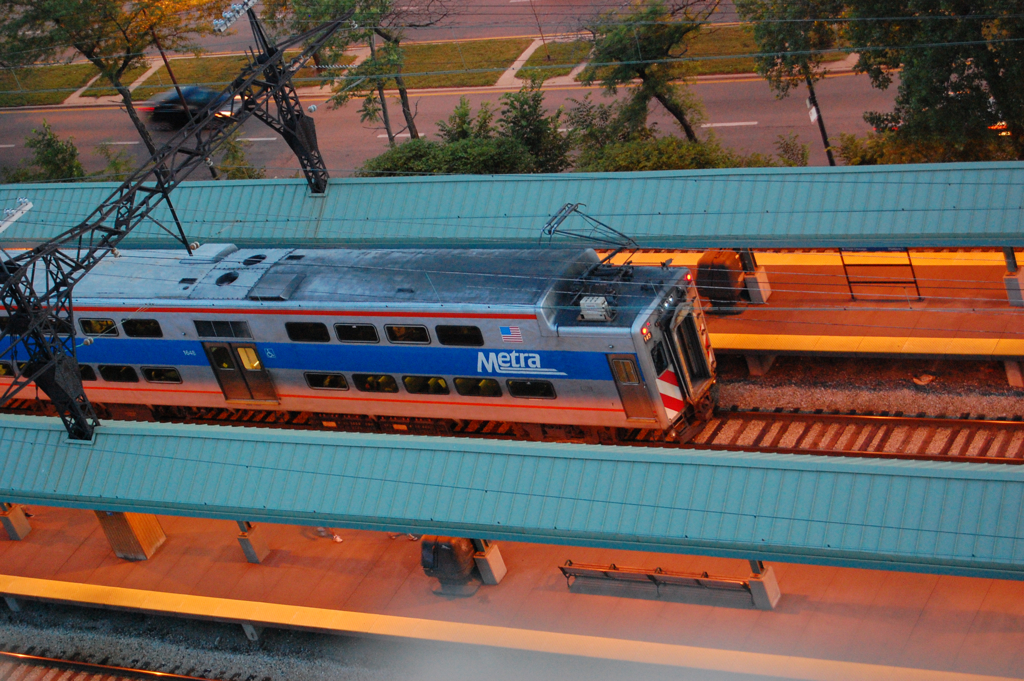
And the other side of that coin is that, by all accounts, things were not great with the recent Chicago Transportation Authority president, Dorval Carter Jr. . I think he had a good start a decade ago, but maybe he was a little burned out by the end, after having to get through COVID and the aftermath. So if the RTA board had the power to say like, "Everyone here except the people who were appointed by the Chicago Mayor, thinks there needs to be a new person running running the CTA, because that affects people in the suburbs too. Of course there are suburban CTA riders.
RBS: And a lot of those CTA routes connect with Pace routes that get people to and from city to suburbs and back. That's why this is a this is not only just a Cook and collar thing. Just last week, the working group heard from the Downstate transit folks. So this is a statewide fix, and I think we've all got to be cognizant of that.
At the same time, we've got to be cognizant of the mindset that when everybody's getting something, the old way of politics, at least, we're all sharing in the reward for this system. To address the issue with the 15 vote override, that's what I thought would be addressed with instead of it being five gubernatorial appointments, it being one for the governor and one for each of the legislative leaders, and maybe even requiring some Senate approval, where these folks really have some transit background.
I’m a former Pace board member. I was on the tollway board. I understand how all that transportation stuff works. And again, it can't be us against them. It's about the fact that all of us should be rowing in the same direction. It's about understanding that I may have to be in favor of something that doesn't necessarily affect my area in a positive way, but it's good for transportation in general.
JG: Do you ever ride transit?
RBS: You know, I do not. I don't venture too far out of my out of my area here, generally by car.
JG: All right. Well, from what you've told me, you seem to have a good grasp of how people are using transit in your district, so that doesn't seem to be a problem.
RBS: My community, to be fully transparent, has agreements with Pace. They provide a circulator that goes from the Blue Line station throughout the shopping area and the entertainment area of Rosemont. We also have a route that goes straight to the arena for certain events. And back in the day, we had it with DePaul, it was a big thing. And George Burns was out there cutting a ribbon with Ray Meyer and my dad, so that was that's very important to us, people taking that public transit into the community and getting around within the community.

JG: The last thing I'd like to ask you about is, what do you think about the funding solutions? As I said earlier, the Democrats want $1.5 billion, and they are up for doing a few different things to raise that money, generally surcharges and fees,such as what they call the "climate impact fee" on non-grocery or non-medical deliveries by motor vehicle..
RBS: Republicans like to call that the “pizza tax."
JG: You know what we call it at Streetsblog: the "burrito taxi tax."
RBS: [Laughs.]
JG: Just a warning, in this post, I'm going to have a cartoon that shows a burrito riding in a taxi.
RBS: [Laughs.]
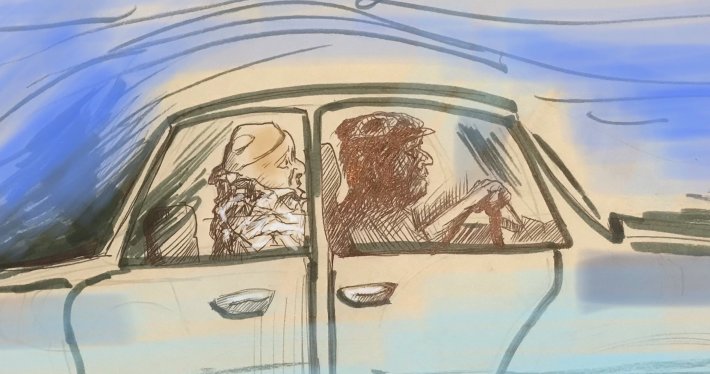
JG: So anyway, the main difference is the Republicans who want to save transit don't necessarily want to do the whole $1.5 billion, and the ones I've talked to definitely are not interested in any additional surcharges or fees. They want to use – I'm not saying this in this disparaging way – the strategy of sort of looking under couch cushions, things like the interest from the Road Fund, interest from the rainy day fund, the Wayfair tax, the RTA found that they're entitled to another $200 million of that.

So I was talking to Don DeWitte, and he said, if you add up all that money, you've almost got $700 million there, almost enough to save transit for the next year.
I asked Leader Delgado about that afterwards after a panel discussion, and she said the problem is, if you only do a one time Band Aid, the budget gap is just going to keep growing each year. So it's much better if you have enough funding so you can improve the system so that we stop bleeding ridership.
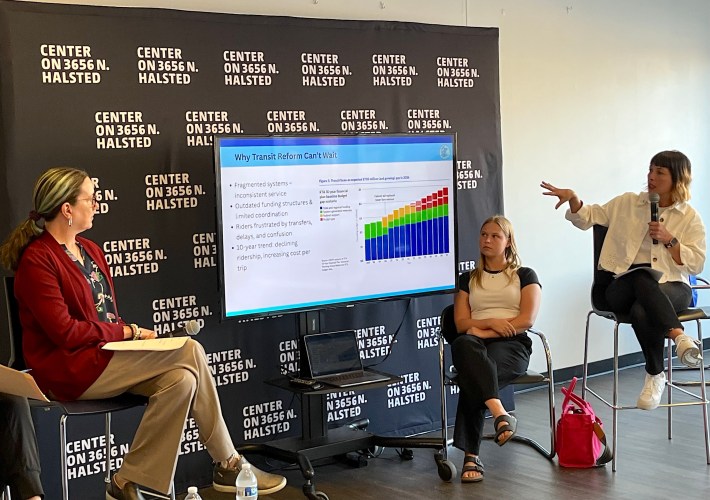
Your district is a lot more transit-dependent than that of the average Springfield Republican. So what is your perspective on that issue, between those two philosophies that I just mentioned?
RBS: The last couple of working groups, we've really gotten a little bit more in the weeds on those things, and we're doing some surveys amongst the members, what they can and what they absolutely cannot be in favor of. I think that I may be a group of one that can probably take some tougher votes on increasing or instituting some of those things that have been talked about. But right now, I don't think there's any overwhelming consensus.
One thing we have to keep in mind is that in the [Chicago Metropolitan Agency for Planning's Plan of Action for Regional Transit], they talked about increasing the RTA tax that's already in place. That's just changing the formula and flipping a switch, and we start collecting money right away.
Some of these new "revenue enhancements," what I'm being told they're called, taxes, would take time to ramp up. It may be eight, ten, twelve months before we start realizing any of those real revenues.
So I don't know that we're at that point of crossing the finish line on what can be voted for. There's other things out there that maybe make some sense, that I don't think made it into the CMAP report, maybe taxing things like the secondary ticket market instead of a transit surcharge for big events and things like that, that we all are still vetting through. And there are some suburban Democrats that aren't all that cozy with some of those taxes, just like myself.
And I would like to see that we can address some of those items that could be immediate and have the ability to implement others that may down the road be needed, sort of like a hybrid on Seth Lewis’ three year ramp-up. Just the ability to do so is important. From taking out of some of the things in the working group, we’re being told that the CTA in 2026 is only a couple hundred million short. There was a talk about them getting a couple hundred million Downstate, but that's to expand track lines and things like that. When you press [the Downstate transit agencies], it's only eighty million that they claim they need.
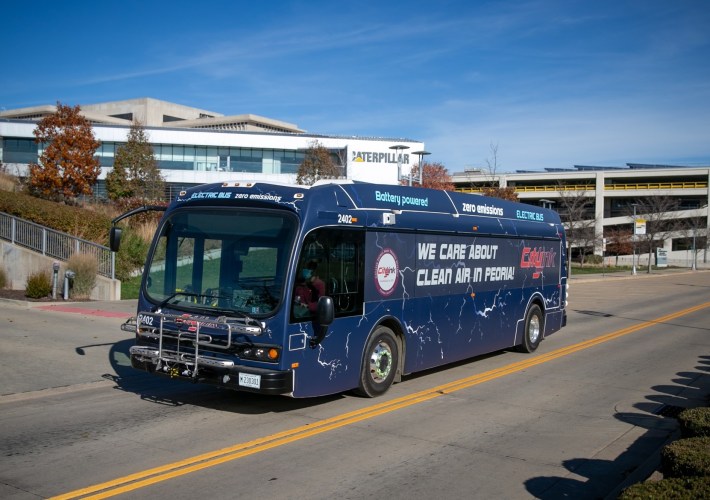
Pace, and not that they’re my favorite child here, but they've made some changes that they think they can get through 2026 without. But again, their process for their budgeting and the public hearings that they've got to have to eliminate service are such that they need to have that. I completely understand that. With Metra, I’m not sure what their operational needs are, so I fall on my sword on that one. But there are some things that I'm going to be able to vote in favor of that others in the Republican Caucus won't be able to because, again, this area here relies on every mode of the transit systems.
JG: Okay, good stuff. So I feel like I'm basically three-for-three with interviews with suburban Republicans who have pretty sane views of transit. So that's that's reassuring.
RBS: Again, we can't pound our chest and say "We can't bail out the city of Chicago." The city of Chicago is important for the entire state of Illinois. We need to keep that sort of frontal lobe. We need to do the right thing, because a lot of the people that use transit and the suburbs are going into jobs in the city, and it's crossing over from one line to the other, whether it's Pace or Metra, and getting onto a CTA train, or vice versa. This is a statewide issue. We need to address it as such, and we need to be very understanding of others. That means that when we're making this decision, we're making it based on transit as a whole.
Check out our interview with House Speaker Welch about public transportation funding here.
Read Streetsblog's recent interview on this topic with Senate President Harmon here.
Read our interview with Sen. Villivalam on this subject here.
Check out our interviews with State Sen. Mike Simmons and State Rep. Hoan Huynh on the topic here.

Do you appreciate Streetsblog Chicago's paywall-free sustainable transportation reporting and advocacy? We officially ended our 2024-25 fund drive in July, but we still need another $43K+ to keep the (bike) lights on in 2026. We'd appreciate any leads on potential major donors or grants. And if you haven't already, please consider making a tax-deductible donation to help us continue publishing next year. Thanks!
